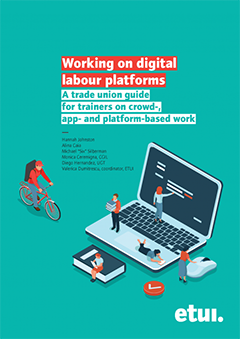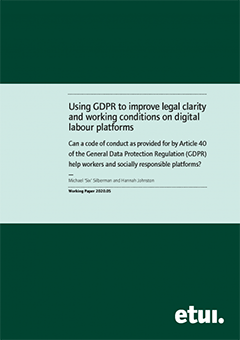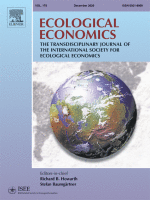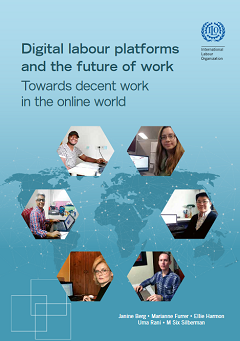The justification and proportionality of these derogations are, in many cases, quite dubious, but that is a matter for a different publication.
—Simonet and García, ‘Chile’s legislative solution for platform work: does it fit the bill?’ Comparative Labor Law & Policy Journal, 2022
Selected recent work

Working on Digital Labour Platforms
A Trade Union Guide for Trainers on Crowd-, App-, and Platform-Based Work
Hannah Johnston, Alina Caia, Michael 'Six' Silberman, Monica Ceremigna, Diego Hernandez, and Valerica Dumitrescu
Published by the European Trade Union Institute
February 2021
104 pp.
Adapted from the Introduction:
Over the past decade, labor platforms—digital platforms that connect workers with work—have emerged as a new trend in the world of work. Connecting predominantly self-employed workers with clients in need of services on an on-demand basis, platforms have proved capable of transforming how, when, and where we work. They have become a reference point in discussions on industry transformation, labor market innovations and the future of work and employment. Their rapid emergence and profound impact merits a deliberate and well-thought-out political and regulatory response, with trade unions having an important role to play in ensuring that the needs and interests of workers remain at the forefront of these debates.
The guide is intended to serve as an informative and educational tool on the topic of digital labor platforms. It was written specifically for trade unionists and other worker representatives, but may also be useful for researchers, students, teachers, journalists, and policy makers. The guide includes an overview of digital labor platforms; cases studies that highlight both benefits and risks of platform work from a worker, trade union, and policy perspective; empirical accounts of different strategies being used by different actors to address the risks, including labor law, social dialogue, voluntary schemes such as codes of conduct, and regulation beyond labor and employment law; and pedagogical exercises for trainers and teachers.
The guide is available in its entirety, in English, Spanish, and Italian, free of charge, on the ETUI website.

Using GDPR to improve legal clarity and working conditions on digital labour platforms
Can a code of conduct as provided for by Article 40 of the General Data Protection Regulation (GDPR) help workers and socially responsible platforms?
Michael 'Six' Silberman and Hannah Johnston
Published by the European Trade Union Institute
December 2020
36 pp.
This paper examines how the General Data Protection Regulation (GDPR) can be used to address procedural problems faced by platform workers, including opaque rating systems, arbitrary account suspension and nonpayment, and uncommunicative clients and platform operators. GDPR provides workers with a variety of rights with respect to their data, including right of access, right to rectification, and rights regarding automated decision-making. Additionally, Art. 40 of the GDPR establishes the possibility for groups of controllers to develop codes of conduct that clarify the application of GDPR to their particular sectors. This paper details the application of GDPR to labor platforms, provides draft text for an Art. 40 code of conduct for labor platforms, and discusses how such a code could help address procedural problems encountered by platform workers.
Although the paper is rather ‘technical’ in that it engages with legal debates in European data protection law, it may be of interest to student and researchers studying labor platforms and data protection broadly, including outside the EU, especially in other jurisdictions that have recently introduced, or are considering, new data protection laws.

“Environment-selected directors”: An interactive simulation experiment of environmental representation on corporate boards
Bill Tomlinson, Michael 'Six' Silberman, Andrew W Torrance, Nick Nikols, Rebecca W Black, Kurt Squire, Paramdeep S Atwal, Ameya N Mandalik, Sahil Railkar, and Mary Kate Workman
Ecological Economics Vol. 178
December 2020
9 pp.
This is the fourth in a series of papers using agent-based modeling and “participatory simulations” — agent-based computational simulations in which some actions of some agents are decided by human “players” (experiment participants) rather than by preprogrammed rules — to simulate possible effects of the Accountable Capitalism Act, a law proposed in 2018 by United States Senator Elizabeth Warren. The first three papers can be found cited in this one.
One-page summary of the findings presented in the four papers (PDF): “Simulation research on the Accountable Capitalism Act — Diverse stakeholder representation on corporate boards: an idea whose time has come” →
Abstract: In many legal frameworks, corporate directors are selected by shareholders. Proposed legislation in the US seeks to enable employee representation on corporate boards as well. Nevertheless, current approaches to corporate board selection could result in the systematic discounting of the needs of other, unrepresented stakeholder groups beyond shareholders and employees. To investigate this issue, we envisioned a new kind of corporate director — the ‘environment-selected director’ — to complement shareholder-selected and employee-selected directors. We conducted an online simulation experiment where human participants were assigned to act as corporate directors, with some being told they were selected by shareholders, some by employees, and some via a “vote by a committee of scientists who study the local and global environment in question.” Results found that participants assigned as environment-selected directors exhibited balanced preferences across stakeholder groups, behavior significantly different from both shareholder-selected directors and employee-selected directors. Further results from 3000 “virtual boards of directors” suggest that boards composed solely of environment-selected directors produce more balanced benefits across all three stakeholder groups studied (shareholders, employees, and the environment) than other configurations of boards. These results suggest that it may be useful for future legislation to consider including this novel form of director, the environment-selected director, on corporate boards.

Digital Labour Platforms and the Future of Work: Towards Decent Work in the Online World
Janine Berg, Uma Rani, Marianne Furrer, Ellie Harmon, and Michael 'Six' Silberman
Published by the International Labour Organization
September 2018
136 pp.
The emergence of online digital labour platforms has been one of the major transformations in the world of work over the past decade. This report provides one of the first comparative studies of working conditions on five major micro-task platforms that operate globally. It is based on an ILO survey covering 3,500 workers in 75 countries around the world and other qualitative surveys. The report analyses the working conditions on these micro-task platforms, including pay rates, work availability and intensity, social protection coverage and work-life balance. The report recommends 18 principles for ensuring decent work on digital labour platforms.
For more publications, see the publications page.



